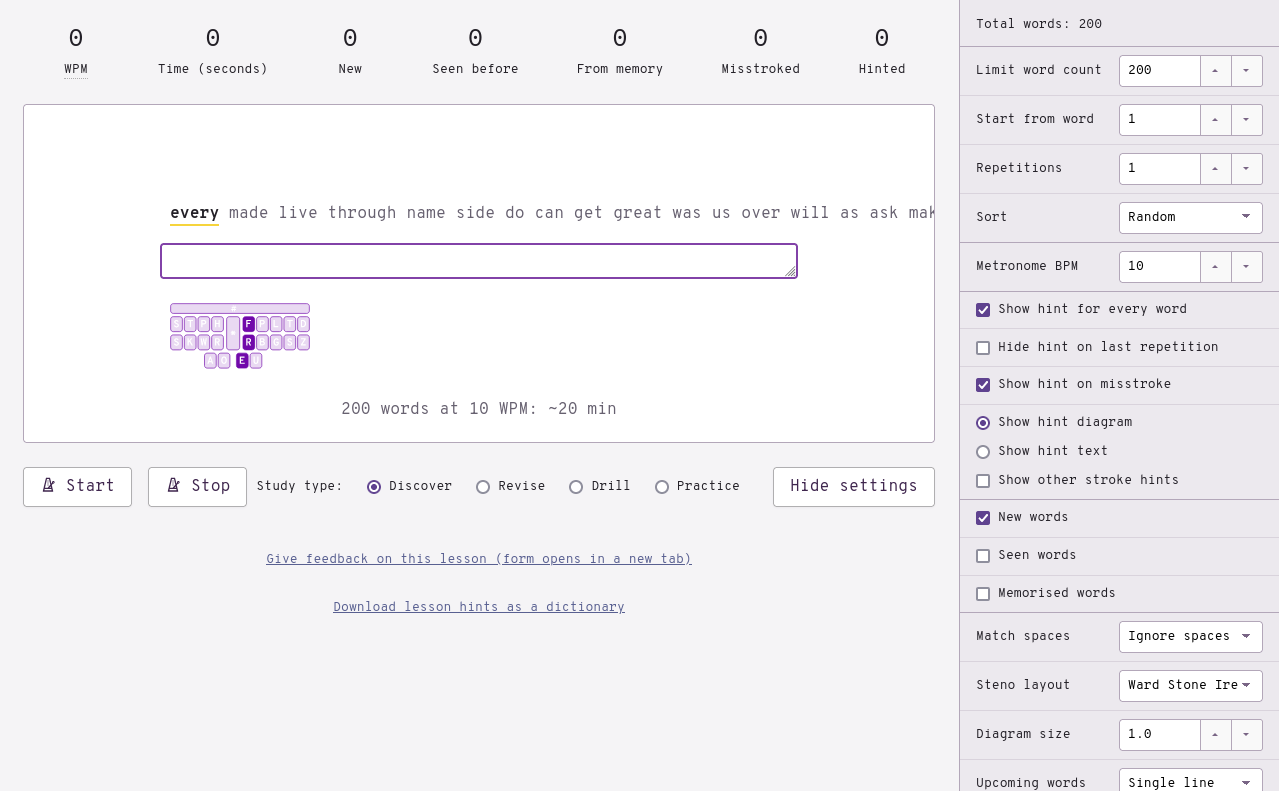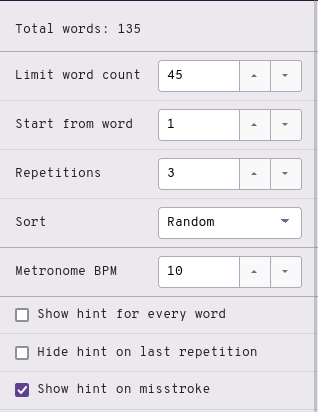Chapter 16: Top 200 common English words
You can skip this if you’ve already been learning the briefs in each chapter!
Useful links
Introduction
In English, the 200 most frequently used words account for something like 80% of all writing. Because of this, these words tend to be written with abbreviated outlines heavily for speed and comfort. About 50 of the 200 most common English words need to be memorized; they cannot always be written with theory principles covered so far. It’s important to be comfortable writing all of these words by the end of this chapter.
Write-outs versus briefs
A write-out refers to an outline that adheres to theory principles very closely. They are the canonical outline to use when in doubt. On the other hand, a brief is an outline that doesn’t necessarily follow theory. It is an abbreviated entry that is used for greater speed.
Some words do not have a write-out entry and will only have a brief which needs to be memorized. On the other hand, some words may only have a write-out. Finally, some may also have a brief and a write-out. If no explanation is provided, you may use either one.
NOTE: you may find other briefs in the dictionary that are not mentioned in this page. I recommend not using them until you are done theory and are comfortable with your dictionary.
How to complete this chapter
It would be extremely hard to memorize many of these briefs just by reading this page. Instead, first skim through this page and then use Typey Type to discover new words. Use these settings:

- Study type: Discover
- Limit word count: 200
- Repetitions: 1
- Sort: Random
- Hide hint on last repetition: unchecked
This way, you can learn the words by simply reading the hints provided. If you come across a brief that is confusing, check back on this page to see if there is an explanation.
Practice material
1–50
the
Brief: -T
of
Brief: -F
to
Brief: TO
Write-out: TAOU
Both outlines are valid to use.
and
Brief: SKP
Useful in phrases such as SKP-T “and the” and SKPU “and you”.
a
Write-out: AEU
A is the “a-” prefix.
in
Brief: TPH
EUPB is the “in-” prefix.
is
Brief: S
it
Brief: T
you
Brief: U
that
Brief: THA
Useful in phrases such as THAT “that the” and THAEU “that I”.
he
Write-out: HAOE
was
Write-out: WAS
for
Brief: TP-R
TPOR is the “for-” prefix.
on
Brief: AUPB or O*PB
OPB is the “on-” prefix.
are
Brief: R or -R
Useful in phrases such as R-T “are the” and THR-R “there are” (see there).
with
Brief: W
Useful in phrases such as W-T “with the” and WU “with you” (see you).
as
Write-out: AS
I
Brief: EU
AOEU is the word “eye”.
his
Write-out: HEUS
they
Brief: THE
Useful for dealing with the “their”, “there”, and “they’re” three-way conflict as “they’re” can be written as THER.
be
Brief: -B
PWE is the “be-” prefix and PWAOE is the word “bee”.
at
Write-out: AT
one
Write-out: WUPB
have
Brief: SR
Useful in phrases like SR-T “have the” and SRU “have you”. HAF is also the word “half”.
this
Brief: TH
Useful in phrases like STH “is this” and TH-S “this is”.
from
Write-out: TPROPL
or
Brief: AOUR or AUR
OR is the “or-” prefix.
had
Brief: H
by
Brief: PWEU
PWAOEU is the “bi-” prefix.
hot
Write-out: HOT
but
Write-out: PWUT
some
Write-out: SOPL
what
Brief: WHA
Useful in phrases like WHAT “what the” and WHAEU “what I”.
there
Brief: THR
Useful in phrases like THR-R “there are” and THR-S “there is”.
we
Write-out: WAOE
To write the word “wee”, use WAO*E.
can
Brief: K
out
Brief: AOUT or O*UT
OUT is the “out-” prefix.
other
Brief: OER
Write-out: O*T/KWRER
The brief is recommended for this common word.
were
Brief: WR
Write-out: WER
The brief is useful in phrases such as WR-T “were the” and WRU “were you”.
all
Write-out: AUL
your
Write-out: KWHUR
The initial “y” consonant was recently changed. If
KWHURdoes not output correctly, you can either use the lookup tool to learn a different brief, or update your dictionary and relearn the initial “y” chord asKWH.
when
Brief: WH
Useful in phrases such as WH-S “when is” and WHU “when you”.
up
Write-out: UP
use
Write-out: AOUS
word
Write-out: WORD
how
Write-out: HOU
said
Brief: SED
The awkward spelling of this word makes a write-out impractical.
an
Write-out: APB
each
Write-out: AOEFP
she
Write-out: SHAOE
51–100
which
Brief: WEU or KH
WEUFP and WHEUFP are the words “witch” and “whisp”.
do
Brief: TKO
TKAOU and TKAO*U are the words “due” and “dew”.
their
Write-out: THAEUR
time
Write-out: TAOEUPL
if
Brief: TP
Useful in phrases like TPU “if you” and TP-T “if the”.
will
Brief: HR
Useful in phrases like HRU “will you” and HR-T “will the”.
way
Write-out: WAEU
about
Brief: PW
many
Brief: PHA*EPB
then
Write-out: THEPB
them
Write-out: THEPL
would
Write-out: WUD
write
Write-out: WRAOEUT
like
Write-out: HRAOEUBG
so
Brief: SO
SOE is the word “sow”.
these
Write-out: THAOES
her
Write-out: HER
long
Write-out: HROPBG
make
Write-out: PHAEUBG
thing
Write-out: THEUPBG
see
Write-out: SAOE
him
Write-out: HEUPL
two
Brief: TWO
has
Write-out: HAS
look
Write-out: HRAOBG
more
Write-out: PHOR
day
Write-out: TKAEU
could
Write-out: KUD
go
Write-out: TKPWOE
come
Write-out: KOPL
did
Brief: TK
Useful in phrases like TK-T “did the” and TKU “did you”.
my
Write-out: PHAOEU
sound
Write-out: SOUPBD
no
Brief: TPHO
TPHOE is the word “know”.
most
Write-out: PHOEFT
number
Write-out: TPHUPL/PWER
who
Brief: WHO
WHAOU is the word “whew”.
over
Brief: AUFR
OEFR is the prefix and AU is an easy to press alternative chord.
know
Write-out: TPHOE
water
Write-out: WAU/TER
than
Write-out: THAPB
call
Write-out: KAUL
first
Brief: TPEUFRT
Write-out: TP*EURS
TPEUFRT uses an inversion (violation of steno order) which is more of a briefing technique than a theory rule.
people
Brief: P
Write-out: PAOEPL
may
Brief: PHAEU
down
Write-out: TKOUPB
side
Write-out: SAOEUD
been
Brief: PW-PB
now
Write-out: TPHOU
find
Write-out: TPAOEUPBD
101–150
any
Brief: TPHEU
new
Brief: TPHU
TPHAOU is the word “knew”
work
Write-out: WORBG
part
Write-out: PART
take
Write-out: TAEUBG
get
Write-out: TKPWET
place
Write-out: PHRAEUS
made
Write-out: PHAED
live
Write-out: HREUF
where
Brief: W-R
Write-out: WHER
after
Brief: AF or AFR
Write-out: AF/TER
back
Write-out: PWABG
little
Brief: HREUL
Write-out: HREUT/-L
only
Brief: OEPBL
Write-out: OEPB/HREU
round
Write-out: ROUPBD
man
Write-out: PHAPB
year
Write-out: KWRAO*ER
came
Write-out: KAEUPL
show
Write-out: SHOE
every
Brief: EFR
good
Write-out: TKPWAOD
me
Write-out: PHAOE
give
Write-out: TKPWEUF
our
Write-out: OUR
under
Brief: TPH-PB or UPBD
Write-out: UPB/TK*ER
UPB/TKER is the “under-” prefix.
name
Write-out: TPHAEUPL
very
Brief: SRE
Write-out: SRER/KWREU
through
Brief: THRU
THRAOU is the word “threw”.
just
Write-out: SKWRUFT
form
Write-out: TPORPL
much
Write-out: PHUFP
great
Write-out: TKPWRAET
think
Brief: THEU
Write-out: TH*EUPBG
If you’re having trouble with the awkward write-out, use the brief instead.
say
Write-out: SAEU
help
Brief: HEP
Write-out: HEL/-P
low
Write-out: HROE
line
Write-out: HRAOEUPB
before
Brief: PW-FR
Write-out: PWE/TPOR
turn
Write-out: TURPB
cause
Write-out: KAUS
same
Write-out: SAEUPL
mean
Write-out: PHAOEPB
differ
Brief: TKEUFR
Write-out: TKEU/TPER
move
Write-out: PHAOUF
right
Write-out: RAOEUT
boy
Write-out: PWOEU
old
Write-out: OELD
too
Write-out: TAO
does
Write-out: TKOS
tell
Write-out: TEL
151–200
sentence
Brief: STEPBS
Write-out: SEPB/TEPBS
set
Write-out: SET
three
Write-out: THRAOE
want
Write-out: WAPBT
air
Write-out: AEUR
well
Write-out: WEL
also
Brief: HR-S
play
Write-out: PHRAEU
small
Write-out: SPHAUL
end
Write-out: EPBD
put
Write-out: PUT
home
Write-out: HOEPL
read
Write-out: RAED
hand
Write-out: HAPBD
port
Write-out: PORT
large
Write-out: HRARPBLG
spell
Write-out: SPEL
add
Write-out: AD
even
Brief: AOEFPB
land
Write-out: HRAPBD
here
Write-out: HAOER
must
Write-out: PHUFT
big
Write-out: PWEUG
high
Write-out: HAOEU
such
Write-out: SUFP
follow
Brief: TPOL
Write-out: TPO/HROE
act
Write-out: ABGT
why
Brief: KWH
Useful in phrases such as KWH-R “why are” and KWH-T “why the”
ask
Brief: SK
Write-out: AFBG
men
Write-out: PHEPB
change
Write-out: KHAEUPBG
went
Write-out: WEPBT
light
Write-out: HRAOEUT
If you feel that “lite” should be written HRAOEUT, feel free to swap these around. However, “lite” is quite a bit more uncommon that I feel it should be given the asterisk.
kind
Write-out: KAOEUPBD
off
Brief: AUF
OF is the prefix.
need
Write-out: TPHAOED
house
Write-out: HOUS
picture
**Brief: P*EUFP **
Write-out: PEUBG/KHUR
try
Brief: TREU
TRAOEU is the “tri-” prefix.
us
Write-out: US
again
Brief: TKPWEPB
Write-out: A/TKPWEPB or A/TKPWAEUPB
Just like with said, the spelling of this word makes a write-out entry ambiguous and slightly impractical.
animal
Brief: PHAPBL or APB/PHAL
Write-out: A/TPHEU/PHAL
The one-stroke brief completely violates steno order. The two-stroke brief drops the “i” vowel as it is unstressed (unemphasized).
point
Write-out: POEUPBT
mother
Brief: PHOER or PHO*RT
Write-out: PHO/THER
world
Write-out: WORLD
near
Write-out: TPHAOER
build
Write-out: PWEULD
self
Brief: SEFL
Write-out: SEL/*F
Remember to use *F when ending a word with the “f” sound.
earth
Write-out: *ERT
father
Brief: TPA*URT
Write-out: TPAU/THER
Chapter 16 test
This chapter’s test consists of the words listed on this page. Use the following settings:

- Limit word count: 45
- Start from word: 1
- Repetitions: 3
- Sort: random
- Show hint for every word: unchecked
- Hide hint on last repetition: unchecked
- Show hint on misstroke: checked
Click here to access the chapter 16 test
Recommended completion goal
This is only a suggestion if you are unsure of when to move on to the next chapter; it is not a strict requirement!
Aim for 10–40 WPM with 90% accuracy.
You may use the test material as practice!